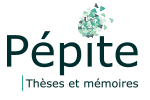L'Imaginaire romanesque et fantasmatique dans l'oeuvre d'Annie Ernaux
The Romanesque and Phantasy Imaginary in Annie Ernaux's Work
- Annie Ernaux
- Romanesque
- Fantasme
- Littérature et psychanalyse
- Littérature et sociologie
- Écritures de soi
- Ernaux, Annie (1940-....)
- Ernaux, Annie (1940-....)
- Imaginaire (psychanalyse)
- Fantasmes
- Psychanalyse et littérature
- Autobiographie
- Annie Ernaux
- Romance
- Phantasy
- Literature and psychoanalysis
- Literature and sociology
- Self-Writing
- Langue : Français
- Discipline : Langue et littérature françaises
- Identifiant : 2023ULILH055
- Type de thèse : Doctorat
- Date de soutenance : 14/12/2023
Résumé en langue originale
Le projet d'écriture d'Annie Ernaux, tout à la fois littéraire et « au-dessous » de la littérature, vise à saisir à la fois la part irréductible de l'expérience intime et son universalité socio-historique. La recherche d'universalisation aboutit cependant, sinon à une aporie, du moins à une résistance et à la nécessité d'écrire des images affectives, sans leur donner de sens. Cette étude entend montrer, en associant poétique, stylistique et psychanalyse, comment l'élaboration d'un imaginaire romanesque et fantasmatique, paradoxal et remarquable dans une écriture marquée par la concision et la rétention, ouvre l'auto-analyse sociologique sur une autre scène, où résonnent les échos d'un moi enfantin dédoublé, et où plane l'ombre blanche du lien mère/fille dans ce qu'il recèle d'ambivalence et de mystère. C'est dans une rêverie ophélienne que se poursuit la quête d'une féminité fuyante ou inaccessible, toujours sur le fil d'une écriture tendue entre volonté de contrôle du sens et abandon à la sensation, entre prosaïsme radical et transe visionnaire hantée par la peur de la folie, sous l'égide de Charlotte Brontë et de Jean Rhys, de Margaret Mitchell et de Virginia Woolf. Bien que le roman soit récusé, jugé inapte à saisir la vérité sociale, familiale et passionnelle que l'écrivaine recherche, un romanesque est donc bien présent, qu'il faut entendre en s'inspirant de Roland Barthes et de Northrop Frye. De même que les romans sentimentaux de l'adolescence, ou la lecture et l'écriture des faits divers horrifiques, la religion, catholique et maternelle, apparaît comme un vecteur d'hallucinations, et plus largement comme le noyau archaïque et infantile de la création. Dès lors apparaît la possibilité d'une transsubstantiation transpersonnelle de l'expérience, transformant l'écriture en rédemption.
Résumé traduit
Annie Ernaux's writing project, both literary and "below" literature, aims at grasping both the irreducible part of intimate experience and its social historical universality. However, the search for universalisation ends up if not in a dead-end but at least to some resistance and to the necessity of writing affective images, without endowing them of any significance. This study intends to show, through the association of poetics, stylistics and psychoanalysis, how the elaboration of a romanesque and fantasmatic imaginary, paradoxical and remarkable in a writing marked with concision and retention, opens up the sociological self-analysis onto another scene, where the echoes of the dual self of a child resound, and where floats the white shadow of the mother/daughter bond, woven with ambivalence and mystery. In an Ophelian reverie, the quest of an elusive or inaccessible femininity goes on, always on the thread of a writing drawn between the will to control any meaning and the giving in to sensation, drawn between a radical prosaicness and a visionary trance haunted by the fear of insanity, under the aegis of Charlotte Brontë and Jean Rhys, of Margaret Mitchell and Virginia Woolf. Although the novel is denied, considered as unsuited to grasp the social, family and passionate truth that the writer looks for, some romanesque is to be found indeed, in the sense Roland Barthes and Northrop Frye use the term. Just as the sentimental novels of adolescence, or the reading and writing of horrific news stories, religion, Catholic and on the mother's side, appears as inducing hallucinations and more widely as the archaic and infantile core of creation. Just then there it is : the possibility of a transpersonal transubstantiation of experience, transforming writing into redemption.
- Directeur(s) de thèse : Chalonge, Florence de
- Président de jury : Blanckeman, Bruno
- Membre(s) de jury : Adler, Aurélie - Hugueny-Léger, Elise - Bloch, Béatrice
- Rapporteur(s) : Blanckeman, Bruno - Decout, Maxime
- Laboratoire : Analyses littéraires et histoire de la langue (Villeneuve d'Ascq, Nord)
- École doctorale : École doctorale Sciences de l'homme et de la société (Lille ; 2006-....)
AUTEUR
- Dussart, François


